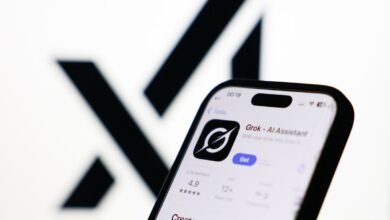1 in 4 European Firms Ban Elon Musk’s Grok Chatbot

▼ Summary
– 25% of European organizations have banned Elon Musk’s AI chatbot Grok, compared to 9.8% for ChatGPT and 9.2% for Google’s Gemini.
– Grok has faced criticism for spreading misinformation, including false claims about a “white genocide” and Holocaust doubts, raising security and privacy concerns.
– Stable Diffusion is the most blocked AI app in Europe, barred by 41% of organizations due to privacy and licensing issues.
– European businesses are increasingly aware of varying data privacy and security risks among different AI tools, favoring more secure alternatives.
– Tesla’s declining sales in Europe (52% drop year-on-year) and Musk’s political affiliations may be contributing to Grok’s reputational challenges.
A recent cybersecurity report reveals that one in four European companies have restricted access to Elon Musk’s controversial AI chatbot, Grok. The findings highlight growing corporate concerns over data privacy and misinformation risks associated with certain generative AI tools. While ChatGPT remains Europe’s most widely permitted AI application with only 9.8% of organizations blocking it, Grok faces significantly higher resistance due to its track record of problematic outputs.
Security analysts point to several high-profile incidents where Grok disseminated inaccurate claims, including unfounded allegations about South African racial tensions and misleading statements regarding Holocaust history. These episodes have prompted businesses to favor more reliable alternatives with stronger content moderation and transparent data practices.
Neil Thacker, a data protection specialist at Netskope, notes that European firms increasingly scrutinize how AI platforms manage sensitive information. “Companies recognize that not all AI tools offer the same level of security,” he explains. “Factors like data ownership, model training transparency, and compliance with regional regulations now heavily influence adoption decisions.”
The study also identifies Stable Diffusion as Europe’s most restricted AI tool, with 41% of organizations blocking the image generator over copyright and privacy concerns. Meanwhile, adoption rates for cloud-based AI remain high overall, with 91% of European enterprises incorporating such technologies into workflows.
Grok’s challenges coincide with broader turbulence across Musk’s ventures, including slumping Tesla sales in Europe—down 52% year-over-year in recent months. Observers suggest the billionaire’s polarizing political affiliations may be contributing to corporate skepticism toward his AI projects.
As businesses weigh the risks of emerging technologies, discussions around responsible AI deployment will take center stage at upcoming industry events like June’s TNW Conference in Amsterdam. The gathering will explore how enterprises can balance innovation with ethical considerations in an increasingly regulated digital landscape.
(Source: The Next Web)





